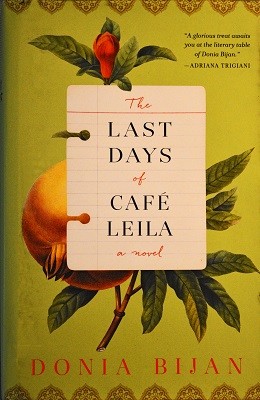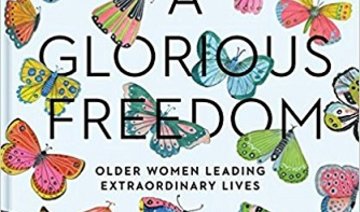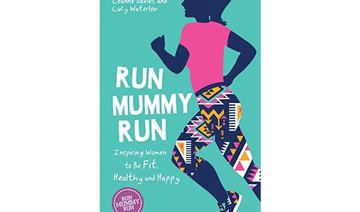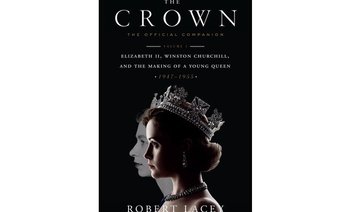Donia Bijan’s debut novel, “Last Days of Café Leila,” is the story of a woman attempting to find herself by rediscovering her family history and her roots: Her native Iran, her parent’s home, and her family’s beloved Café Leila.
Bijan herself left Iran in 1978 and ran a restaurant in Palo Alto, California, for 10 years, so there are clearly some autobiographical touches in the novel.
Run by three-generations of the Yadegar family, Café Leila has stood throughout Iran’s political turmoil and its effects on the country and its people. It is a powerful novel about family, strength, and resilience that sweeps the reader into Tehran and into the lives of the Yadegars from the early 1930s to the present day.
Behzod (Zod) Yadegar, the café’s second-generation owner, is in Tehran waiting for the postman to deliver a letter from his daughter, Noor. But sometimes letters from America can take two or three weeks to arrive.
Meanwhile, Noor, a nurse in San Francisco, has left her husband of 16 years, due to his infidelity, and moved into an apartment with her teenage daughter. Eventually, unable to pull herself out of the hole she has fallen into, Noor writes to her father and asks her if she can come back home.
This is when the story moves to Tehran and Café Leila.
“In a cul-de-sac at the end of Nasrin Street, quiet except at the hour when the kindergartners at Firouzeh Elementary were set free, sat a faded yellow brick building detached from its neighbors. Here, beneath a recessed sign, was Café Leila, its entrance framed in a low-hanging wisteria in full bloom.”
Within the confines of Café Leila, its garden and the now-obsolete Hotel Leila are Zod; 85-year-old Naneh Goli — Zod’s old nanny; waiters Hedayat and Aladdin who “still wore the same faded dark blue jackets with gold-fringed epaulettes, making them look like retired generals;” cousin Soli, who joined the staff after the war; and Karim, a young orphan apprentice who does odd jobs around the complex when not in school. With the exception of Soli and Karim, these are all the people Noor left behind nearly 30 years ago.
Bijan sensitively contrasts Noor’s San Francisco and Zod’s Tehran. In America, there is cautious comfort, a beauty Noor recognizes, but from which she feels disconnected. In Tehran there is a familiarity, a certain sense of calm, despite the troubles and fear of political edicts.
Bijan also contrasts the emotions of mother and daughter. Lily, born and raised in America, is furious about their move. She has never visited Iran and does not speak the language. But Noor realizes her life in San Francisco had left her feeling empty, and finally feels a sense of belonging. “The world changed around Café Leila, but the life that had gone on there since the 1930s continued,” Bijan writes. The café is the glue that holds three generations together.
In every corner of the house, restaurant and garden are bits and pieces of Noor’s life, as well as the lives of her brother Mehrdad, her parents and her Russian expat grandparents who first opened the café. Noor embraces that past as the Café does — a history spanning generations. The small orchard of pomegranate, almond and mulberry planted by Noor’s grandfather Yanik, for instance, “Year after year they blossomed, filling the air with their sweet smell, regardless of political turmoil or the events on the street.” Through Yanik and Nina came a love for Iran and for Persian food that lives on through Zod and Noor.
Bijan’s story is a refreshing take on the immigrant experience — one that is filled with the discovery of culture and of delicious and inventive cuisine.
There is trouble for Noor and Lily in Tehran, in the form of restrictive laws and an ailing, elderly father, but somehow the two women manage to find themselves, or, in Lily’s case, another version of herself she was unaware existed.
“Last Days of Café Leila” is about cherishing the past and reclaiming spaces in both the physical and mental realms. It is about understanding oneself through one’s family and traditions. It is a journey that keeps Noor teetering on a line between her two roles of daughter to a sick father and mother to a defiant teenager.
Bijan writes beautifully of a homecoming, not only in terms of familial ties, but also the sensual experience: the trees, the sounds, the sights, and smells.
Café Leila is not just Noor’s childhood home, it is a place of refuge, healing, and a place of acceptance no matter status or creed.
Bijan leads her readers through a spectrum of emotions with an incredibly relatable story, especially for people who have had to leave their homes for whatever reason. Bijan, through Noor, sums up the story simply and powerfully: “(She) couldn’t do anything to change the conditions, she couldn’t deny her awareness and she couldn’t stand in the way of death or love. The only thing to do was to keep moving, to do something, to show courage, to give everything she was capable of giving.”
Book Review: The story of a woman on a quest to find herself
Book Review: The story of a woman on a quest to find herself

Book Review: The AI-Centered Enterprise

What lies beyond ChatGPT for businesses?
In The AI-Centered Enterprise: Reshaping Organizations with Context-Aware AI, authors Ram Bala, Natarajan Balasubramanian and Amit Joshi argue that the next leap in artificial intelligence is not about flashy prompts, but rather perception, reasoning, and organizational transformation.
The book, published earlier this year, introduces the concept of “context-aware AI,” systems that do not just process information but understand it in real-time business scenarios.
These are tools that adjust to their environment, collaborate across teams, and make decisions with nuance; a significant step forward from today’s mostly predictive systems.
The authors, all professors and practitioners in the AI and analytics space, offer a clear roadmap for businesses to prepare.
Their proposed model, the “3Cs” — “Calibrate, Clarify, Channelize” — breaks down how leaders can align AI tools with company values, ensure teams understand how to use them, and direct efforts where they will have the most impact.
For readers in Saudi Arabia, where AI is central to Vision 2030 initiative, this book can serve as a strategic lens.
While it does not focus on the region, its practical insights are useful for decision-makers looking to scale AI responsibly across sectors such as healthcare, logistics, and government services.
More guidebook than manifesto, “The AI-Centered Enterprise” avoids jargon and balances case studies with actionable ideas.
It will not dazzle readers chasing science-fiction futures, but it is a timely read for professionals who want to lead, not just react, in the age of intelligent systems.
What We Are Reading Today: ‘Wild Orcas’

Author: Hanne Strager & Catherine Denardo
Of the world’s iconic predatory species, orcas are among the most fearsome. Their awesome physical power combined with their cooperative hunting skills and ability to problem-solve make them uniquely efficient killers. Yet orcas also celebrate births, grieve losses, and maintain lifelong family bonds. This stunningly illustrated book draws on five decades of field research and cutting-edge science to provide an incomparable look at the biology, natural history, culture, and conservation of these awe-inspiring marine animals.
Sudanese novelist Leila Aboulela awarded PEN Pinter prize for her work on migration

- Acclaimed novelist recognized for exploring themes of faith, migration and Muslim women’s lives
LONDON: Sudanese author Leila Aboulela has been named the winner of the 2025 PEN Pinter Prize, honoring her literary contributions that explore themes of faith, migration and the lives of Muslim women in displacement.
The award was announced at English PEN’s annual summer party on Wednesday at the October Gallery in London.
Judges praised the author for her “nuanced and rich perspectives on themes that are vital in our contemporary world: Faith, migration and displacement,” calling her work “a balm, a shelter and an inspiration.”
Aboulela, who grew up in Khartoum and has lived in Aberdeen, Scotland since 1990, is known for her six novels including “Minaret,” “The Translator,” a New York Times 100 Notable Books of the Year, and “Lyrics Alley,” as well as two short story collections.
Her latest collection “Elsewhere, Home” won the Saltire Fiction Book of the Year Award.
Aboulela’s latest novel “River Spirit,” which was published in 2023, portrays the period leading up to the British conquest of Sudan in 1898, shedding light on the complex human dimensions of the conflict between Britain and Sudan, Christianity and Islam, and the dynamics of colonizer versus colonized.
On receiving the award, she said: “For someone like me, a Muslim Sudanese immigrant who writes from a religious perspective, probing the limits of secular tolerance, this recognition feels truly significant. It brings expansion and depth to the meaning of freedom of expression and whose stories get heard.”
She will officially receive the award at a ceremony at the British Library on Oct. 10, where she will also announce the recipient of the accompanying Writer of Courage award.
This year’s judging panel included poet and author Mona Arshi, novelist Nadifa Mohamed, and English PEN chair Ruth Borthwick, who praised Aboulela’s work for its literary depth and social relevance.
“Leila Aboulela’s writing is extraordinary in its range and sensibility,” Borthwick said. “From jewel-like short stories to tender novels, she tells us rarely heard stories that make us think anew about who lives in our neighborhoods and communities, and how they navigate their lives.”
Arshi said that the author “offers us nuanced and rich perspectives on themes that are vital in our contemporary world: Faith, migration, and displacement,” while Mohamed praised Aboulela’s work for centring “the lives and decisions of Muslim women.”
“Her work is marked by a commitment to make the lives and decisions of Muslim women central, and to examine their struggles and pleasures with dignity,” Mohamed said.
The PEN Pinter Prize was established in 2009 in memory of Nobel Laureate Harold Pinter. Previous winners include Arundhati Roy in 2024 and Michael Rosen in 2023.
What We Are Reading Today: ‘Birds of the Tropical Andes’

Authors: Owen Deutsch & Michael J. Parr
Spanning much of the western part of South America, the Andes are home to some of the world’s most magnificent birds, from exquisite hummingbirds to fabulous flamingos.
This beautifully illustrated large-format book celebrates the splendor and extraordinary diversity of Andean birds and the habitats they depend on.
It draws on the latest findings from the field and sheds light on the lush alpine and forested terrains that make this avifauna so rich and plentiful.
What We Are Reading Today: ‘Paper: Paging Through History’

- Each papermaker refined their formula to allow ink to glide but not soak, creating sheets that were durable and portable
Author: Mark Kurlansky
“Paper: Paging Through History” by Mark Kurlansky, published in 2016, is a sweeping, detailed chronicle of how paper, arguably one of humanity’s most versatile inventions, traveled from its origins in ancient China across continents and centuries to reshape civilizations.
Kurlansky, an American journalist known for his deep dives into everyday materials, traces how humans moved from parchment and silk to mulberry bark and linen rags.
Oral narrators once carried knowledge across generations; paper allowed that information to outlive them.
Each papermaker refined their formula to allow ink to glide but not soak, creating sheets that were durable and portable.
The watermark, made from a simple wire design, left a faint imprint that branded the paper. That part was owned by the papermaker, not the paper mill, and customers began choosing paper based on those marks.
Paper was introduced to Europe by Arabs, who brought refined papermaking techniques to the continent. Europeans initially hesitated to adopt paper widely because oral tradition was the preferred way to share important stories; they felt that writing it down cheapened its value.
Over time, through trade and cultural contact in regions like Andalusia and along the Silk Road, paper gradually gained acceptance and became widely used.
Kurlansky delves into how the use of paper birthed various industries. It offered people with an entrepreneurial spirit the ability to make a living.
Papermakers changed the art world, too, with the introduction of special papers, such as watercolor paper.
Paper also shifted the world of journalism: Broadsheets, magazines, pamphlets, almanacs and, of course, books became more widely available at a lower cost. Yesterday’s newspaper would also be reused to line things like bird cages or to wrap food with.
It helped popularize things like playing cards, wrapping paper, wallpaper, paper fans, greeting cards and paper money, and lent itself to important medical, legal and political documents, such as the US Declaration of Independence.
“Paper: Paging Through History” was such a captivating read that I often paused to reflect, and I told everyone around me about the book. One moment that stood out was the 19th-century French campaign in which women were encouraged to donate their old handkerchiefs and linen to papermakers, as it might one day return to them in the form of a love letter.
Today, paper remains a vital medium where thoughts, plans, and dreams are recorded.
It might seem mundane, but in an increasingly digitized world, its ability to let a narrative stand the test of time is history itself, like this very book.





















